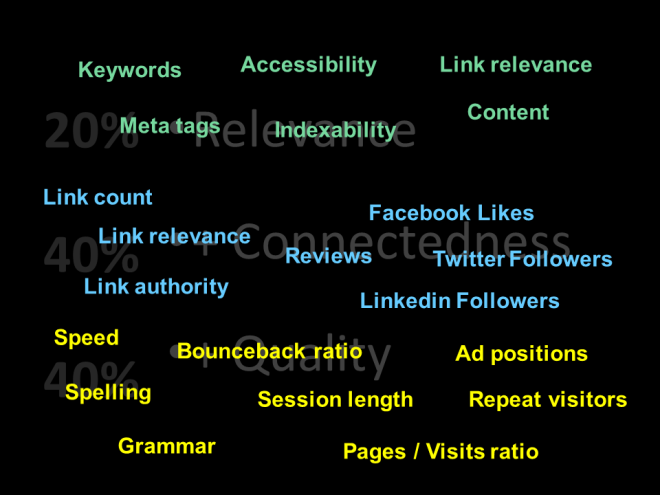When you’ve spent time and effort on a website, it’s important that people visit it: given most searches for property or for an agency start in Google, that means your website needs to be listed by Google in its search results. Search Engine Optimisation (SEO) is the process of ensuring that Google can find, read and understand your website, so that it can then list it in relevant search result lists.
This is our basic guide, introducing some of the fundamental concepts.
The graphic below shows three groupings of factors that impact your SEO that you need to be aware of. Broadly speaking, they are classified into “Relevance” (the set of factors shown in green in the graphic); “Connectedness” (the factors shown in blue); and “Quality” (the factors shown in yellow).

Relevance
These are factors that were most important to SEO a few years ago, and although they are still important to consider, much of Google’s thinking has moved on to other influencing factors. These contribute to the general view of whether a website is relevant to the specific search: Google will consider the number of pages it can read on your site that it deems relevant to the search, and the number of links that you have pointing at your site is important. Do not buy links or organise lots of links on unrelated websites, as Google now knows that you’re trying to influence it, and that’s something to avoid: Google will downgrade your site if it thinks you’re trying to “game the system“.
Connectedness
It is increasingly important how connected your site is to other sites. This used to be measured primarily by how many links you had to your site, a factor which Google augmented by considering how relevant the sites are that link to yours, and how authoritative the linking site is too. For example, having a link from the BBC, on a page dedicated to estate agencies, would score very highly, as Google considers the BBC as highly authoritative, and the page would be relevant.
Over time, and with the advent of social media, Google has evolved its view on how connected your site is to include various measures of sentiment that it picks up from the large social networks. For example, if your site has reviews on Google, and your company has profiles on Facebook, LinkedIn and Twitter with lots of followers and a large “like count”, then Google will understand that your business is popular, and it has been approved by the general public: as such, Google is more likely to recommend you. It is trying to learn from people what are the best sites to recommend for any specific search, and will use these social media signals to help it understand that public sentiment.
Quality
Quality is thought to be one of the more recent trends at Google, as it judges not just the content of your website, but also the level of its quality. This may be by checking the spelling and grammar, but it’s also in the page speed and user metrics: Google will see how long users stay on your site, how many pages they read, and how often they come back, all to determine whether users like what they find. Google collects all this information from users who use its Google Chrome browser and through its Google Analytics tool that many websites use – from those sources, it has an extraordinary depth of understanding about your website and how engaging it is for users. Ultimately, Google wants to be recommending in its results websites that it knows people will enjoy, so these quality metrics are a key part of how it assesses and ranks your site.
If you’d like to delve deeper into these factors, how they affect your SEO, and how improving your website could help your business, contact us to discuss how we can help you with better SEO for a better website.